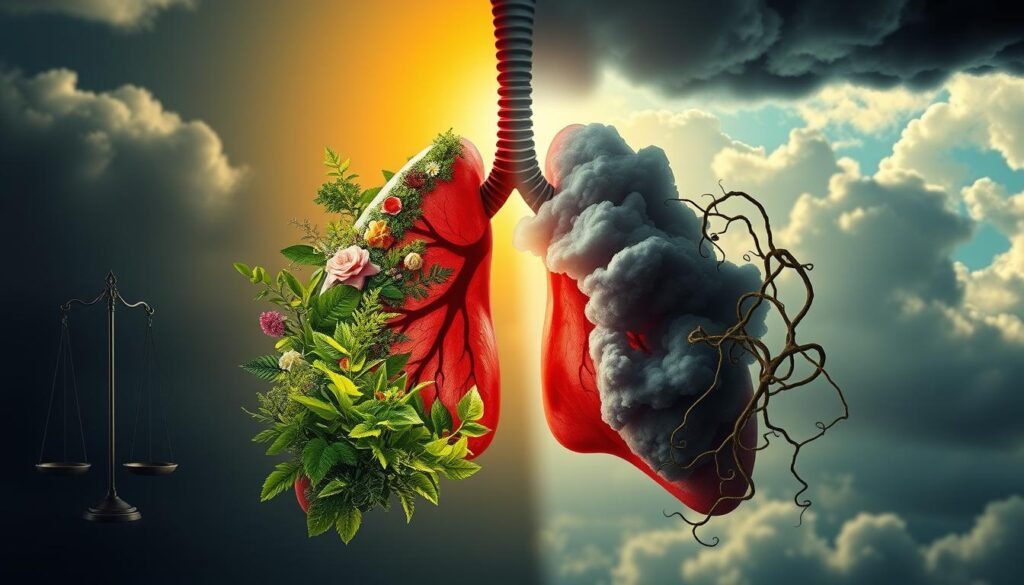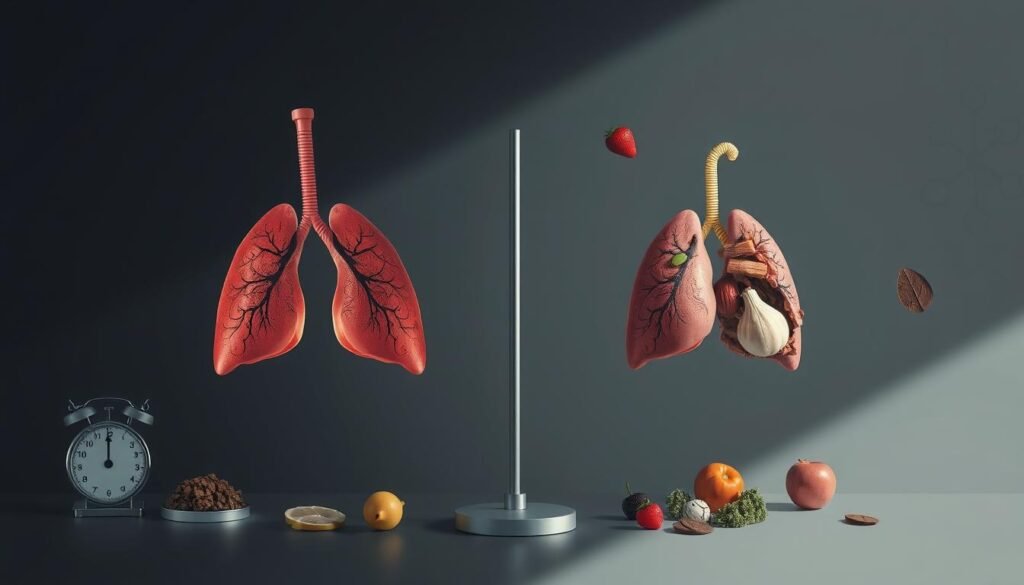Around 60% of lung cancer patients lose weight during treatment. Yet, some patients might actually gain weight. This reveals the complex nature of weight changes in lung cancer. Researchers call this the “obesity paradox”. It means patients with higher BMIs might have better outcomes and live longer. Knowing about lung cancer weight gain is key. It helps improve management and patient quality of life.
The connection between weight changes and patient survival is not simple. It involves treatment-related appetite changes and cancer cachexia. This is a serious condition causing weight and muscle loss. Understanding these factors is important. It helps healthcare providers and patients deal with treatment challenges. This, in turn, impacts health and emotional well-being.
Key Takeaways
- Lung cancer is the leading cause of cancer deaths worldwide.
- About 60% of lung cancer patients may face weight loss, while some may gain weight.
- The “obesity paradox” suggests overweight individuals may have better treatment outcomes.
- Cancer cachexia significantly influences weight changes during treatment.
- Understanding weight changes is essential for improving patient quality of life.
Introduction to Lung Cancer and Weight Changes
Lung cancer makes up about 13% of all cancer cases worldwide. This makes it a serious health issue. Those being treated for lung cancer often see their weight change. About 60% lose weight while they’re undergoing treatment. These weight changes can make treatment and recovery harder.
Two main factors come into play here: appetite changes and cancer cachexia. Appetite can decrease because of the stress and pain of the illness. This leads to not eating enough and losing more weight. Cancer cachexia is when someone loses a lot of weight and muscle. It makes the situation even tougher. Understanding these issues helps us support lung cancer patients better.
Knowing how lung cancer affects weight is crucial in caring for patients. It helps doctors create better plans for managing these weight changes. This can make the treatment journey a bit easier for patients.
The Obesity Paradox in Lung Cancer
The obesity paradox is a surprising trend seen in lung cancer research. It shows that people with a high body mass index (BMI) often have better survival rates. Though being overweight usually leads to health problems, these patients may have a better lung cancer prognosis.
Understanding the Relationship Between Weight and Prognosis
Looking into the obesity paradox means examining weight and lung cancer outcomes closely. Researchers use different methods, like waist size and waist-to-hip ratio, to study body fat more accurately. Where your body holds fat can play a big role in lung cancer risk and recovery.
Why Higher BMI May Be Associated with Improved Outcomes
Some research points out that a higher BMI might help with treatment success and longer life for lung cancer patients. This is especially true for patients getting treatments that help the immune system attack cancer. But results vary due to differences in how studies measure things and other factors, such as smoking and certain medications.
This summary table shows what recent studies have found about obesity and lung cancer:
| Study Focus | Findings |
|---|---|
| High BMI and Lung Cancer Risk | Inversely associated with lung cancer risk across several meta-analyses |
| Central Adiposity Metrics | Waist circumference and waist-hip ratio link to increased lung cancer risk |
| Obesity and Treatment Outcomes | Higher BMI correlates with improved survival in immune checkpoint inhibitor therapy |
| Standardization Challenges | Lack of consistent measurement techniques affects outcome variability |

For more about the obesity paradox in lung cancer, check the relevant studies and findings.
Causes of Lung Cancer Weight Gain
Lung cancer weight gain is influenced by various factors. These include treatment effects and the disease itself. Knowing these causes helps in managing weight for those in treatment.
Appetite Changes Due to Treatment
Many lung cancer patients see changes in their appetite due to treatment. They might take medications that increase hunger. This can lead to eating more, helping to avoid weight loss linked with the disease. During treatment, appetite can change, needing a special diet to get enough nutrients.
The Role of Cancer Cachexia
Cancer cachexia is a complex condition seen in cancer patients, including those with lung cancer. It causes a loss of muscle while appetite may also drop. This makes gaining weight hard, challenging patients’ weight management plans. To fight cancer cachexia, nutritional support is crucial. It helps maintain muscle and improves life quality during treatment.

| Factor | Effect on Weight |
|---|---|
| Medications for appetite stimulation | Can lead to increased caloric intake and weight gain |
| Cancer cachexia | Causes muscle loss, complicating weight gain efforts |
| Appetite fluctuations | Affects caloric intake consistency |
| Nutritional interventions | Essential for managing weight and muscle mass |
Lung Cancer Weight Gain: A Double-Edged Sword
Weight gain during lung cancer treatment can be significant. It brings both benefits and challenges. Knowing about this weight gain is important for managing it well.
Potential Benefits of Weight Gain During Treatment
Gaining weight can really help lung cancer patients. It can make treatment easier and improve outcomes. Having enough weight can help patients deal with therapy side effects.
Risks Associated with Excess Weight
However, being overweight has risks. It might increase the chances of problems during surgery. It can also cause issues with cancer treatment if you have other health problems.

| Aspect | Weight Gain Benefits | Excess Weight Risks |
|---|---|---|
| Nutritional Status | Improved nourishment for better treatment outcomes | Potential nutritional imbalances |
| Treatment Tolerance | Enhanced resilience to therapy | Increased complications during surgery |
| Health Management | Supports overall health stability | Higher chances of comorbidities interfering with treatment |
It’s crucial to have a tailored approach to weight management during treatment. For more information on weight loss in lung cancer patients, click here.
The Impact of Nutrition on Weight Management in Lung Cancer
Nutrition is key for lung cancer patients, especially in managing weight during treatment. A good diet and nutritional supplements help meet their caloric and nutritional needs. This is important when appetite drops or when the body needs more energy.
Nutritional Supplements and Their Role
Nutritional supplements play a big role for many lung cancer patients. They help fill in nutritional gaps. Supplements with omega-3 fatty acids can reduce inflammation and improve nutrition. Research shows they lower inflammation markers like CRP and TNFα when added to diets. These supplements are vital for those losing weight without wanting to or whose bodies are using energy differently.
Strategies for Maintaining a Healthy Diet
Keeping a healthy diet is crucial to keep muscle and avoid too much weight gain. Here are some tips:
- Eat foods rich in nutrients, like lean proteins, whole grains, and fruits and veggies.
- Watch how many calories you eat, depending on your weight and treatment phase.
- Work with a dietitian to make a plan that fits your special health needs.
- Try high-protein snacks that are easy to eat to get enough protein.
| Body Weight (lbs) | Calories/Day | Protein (grams/day) |
|---|---|---|
| 110 | 1500 – 1750 | 60 – 75 |
| 130 | 1750 – 2060 | 70 – 90 |
| 150 | 2050 – 2375 | 80 – 100 |
| 170 | 2300 – 2670 | 90 – 115 |
| 190 | 2575 – 3010 | 100 – 130 |
| 210 | 2850 – 3325 | 115 – 140 |
Drinking enough water is just as important. How much you need depends on your weight. It’s usually between 50 to 105 fluid ounces a day. Focusing on both nutrition and hydration can really help treatment work better and improve life quality.
Understanding Caloric Needs and Intake
Dealing with lung cancer weight means calories count a lot. It’s vital to calculate your calorie intake right to keep energy balanced during treatment. This includes looking at your metabolic rate, how active you are, and any changes from treatment. Watching your calories is key to feeling better and making treatment work well.
Calculating Calorie Intake During Treatment
It’s important to figure your calories based on your situation and how you respond to treatment. For example, high-calorie menus show you might need between 3,000 to 3,300 calories a day. These menus plan out what to eat for meals and snacks:
| Meal/Snack | Calories (Day 1) | Calories (Day 2) | Calories (Day 3) |
|---|---|---|---|
| Breakfast | 800 | 900 | 850 |
| Morning Snack | 300 | 400 | 350 |
| Lunch | 900 | 1000 | 950 |
| Afternoon Snack | 400 | 300 | 350 |
| Dinner | 900 | 800 | 950 |
| Bedtime Snack | 300 | 300 | 300 |
To hit your calorie goals, eat high-calorie foods like butter, whole milk, nuts, and cheese. Always change your diet with advice from your doctor to match your needs.
Adjusting for Changes in Physical Activity
Patients often move less during treatment, which means they need to adjust their exercise. Finding out how active you are helps change how many calories you need. Adding exercises to build strength and keep you moving can stop too much weight loss. Changing what you eat to match how much energy you have is big for managing lung cancer weight.
Eating right is a big deal for stopping problems and helping recovery. To learn more about how nutrition helps, you can check out this study.
Weight Management Strategies for Lung Cancer Patients
Weight management in lung cancer patients calls for a varied plan. It’s important to work with healthcare providers to customize strategies. This includes exercises to prevent weight gain and improve health, mood, and life quality.
Exercise Recommendations to Combat Weight Gain
To manage weight well, having a structured workout plan is key. Here are some main tips:
- Start slowly: Begin with lighter activities, then gradually do more as you get stronger.
- Incorporate both cardio and strength training: Try brisk walking, biking, and resistance training for muscle and weight control.
- Focus on consistency: Aim for 150 minutes of moderate aerobic activity each week.
- Stay active during treatment: Exercising helps with fatigue, keeps up your appetite, and boosts your overall wellness.
Working with Healthcare Providers
For weight management to work, patients and medical teams must collaborate closely. Oncologists, dietitians, and therapists aim to:
- Monitor nutritional intake: Keeping an eye on nutrition helps spot and address malnutrition.
- Tailor exercise programs: Customized fitness plans consider side effects and personal ability for better results.
- Adjust weight management strategies: Adapting the plan as treatment goes on meets evolving needs.
- Provide emotional and psychological support: Mental health is key, so support networks are essential for total care.
Exploring dietary counseling can help with taste changes during lung cancer treatment. By combining exercise and teamwork with healthcare, lung cancer patients can improve their health during and after treatment.
Lung Cancer Weight Gain and Its Emotional Impact
Weight gain during lung cancer treatment can deeply affect patients’ mental well-being and life quality. It often leads to body image worries, anxiety, and depression due to weight changes. These psychological effects include feelings of sadness, numbness, and energy level shifts during their cancer journey.
The Psychological Effects of Weight Changes
Unintended weight gain can cause more anxiety. Patients worry about dying and their future treatments. They may experience rapid heartbeat, headaches, and stress over insurance.
It’s vital to care for emotional health as physical. Depressive symptoms might show up as weight changes. Doctors and caregivers need to watch for any weight shifts that indicate emotional issues.
Building a Support System for Patients
Creating a support network is key for coping with weight change effects. This network should include medical staff, family, and peer groups. Such support helps patients express their worries and better handle their emotions during treatment.
For more advice, patients can check this resource. It highlights the need for professional advice, diet planning, and emotional backing.